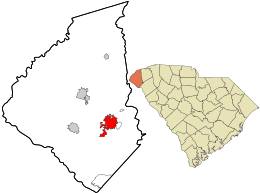Seneca, South Carolina
| Seneca, South Carolina | |
|---|---|
| Town | |
| Motto: City of Smiles, City with Style | |
 Location in Oconee County and the state of South Carolina. |
|
| Coordinates: 34°41′3″N 82°57′21″W / 34.68417°N 82.95583°WCoordinates: 34°41′3″N 82°57′21″W / 34.68417°N 82.95583°W | |
| Country | United States |
| State | South Carolina |
| County | Oconee |
| Government | |
| • Mayor | Daniel W. Alexander |
| Area | |
| • Total | 7.1 sq mi (18.4 km2) |
| • Land | 7.1 sq mi (18.3 km2) |
| • Water | 0.0 sq mi (0.1 km2) |
| Elevation | 965 ft (294 m) |
| Population (2010) | |
| • Total | 8,102 |
| • Density | 1,084.6/sq mi (418.8/km2) |
| Time zone | Eastern (EST) (UTC-5) |
| • Summer (DST) | EDT (UTC-4) |
| ZIP codes | 29672, 29678, 29679 |
| Area code(s) | 864 |
| FIPS code | 45-65095 |
| GNIS feature ID | 1250833 |
| Website | http://www.seneca.sc.us/ |
Seneca is a city in Oconee County, South Carolina, United States. The population was 8,102 at the 2010 census. It is the principal city of the Seneca Micropolitan Statistical Area (population 74,273 at the 2010 census), an (MSA) which includes all of Oconee County and which is further included in the greater Greenville-Spartanburg-Anderson, South Carolina Combined Statistical Area (population 1,266,995 at the 2010 census).
The Democratic Vice-Presidential candidate for 2004, former United States Senator from North Carolina, John Edwards, was born in Seneca. It was named for the nearby Cherokee town of Isunigu, known to the English as "Seneca Town".
Seneca was founded as Seneca City and named for a nearby Native American village and the Seneca River. The town was located at the intersection of the Blue Ridge Railroad and the newly built Atlanta and Charlotte Air Line Railroad. Both lines are now part of the Norfolk Southern Railway. A. W. Thompson and J. J. Norton, who were locating engineers for the Air Line Railroad, purchased the land from Col. Brown of Anderson, South Carolina. A stake marking the center of town was driven into the intersection of the railroad tracks and the current Townville Street. The land was divided into lots for one-half mile from the stake. An auction was held on August 14, 1873. The town was given a charter by the state legislature on March 14, 1874. In 1908, the name was changed to Seneca.
...
Wikipedia
